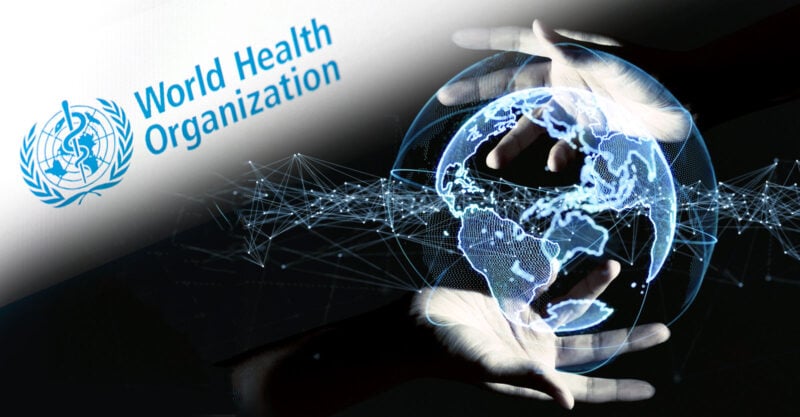37 Votes to Nil. Louisiana bans the World Health Organisation.
Fri 9:10 am +00:00, 29 Mar 2024
Information and Support for State action regarding W.H.O. via Door To Freedom Prepared by merylnass@gmail.com (Dr. Meryl Nass) DoortoFreedom.org. SovereigntyCoalition.org Door to Freedom is rolling out a campaign in the US to educate policymakers and the public on the WHO’s plans to govern health worldwide, especially during pandemics. The way the WHO hopes to accomplish this is through two treaties that are coming up for a vote during the last week of May. The WHO has been co-opted to start the process of centralizing the powers of 194 governments, under the guise of health, in one place. The EU, G20, G7, World Bank, US federal government and UN all agree with this plan. In a nutshell, if approved, these documents would give the WHO the power to tell nations what they must do and what laws they must pass for health, and also to protect the novel concept “One Health,” which includes the health of plants, animals and ecosystems, whose health is to be balanced with human health. Two laws that are being required are:
The WHO also wants to host a library of “potential pandemic pathogens” (a euphemism for potential biological warfare agents) which it will share globally, and not only during pandemics, but all the time. This is a thinly veiled attempt to increase the number of pandemics we will face in future, while making it impossible to know exactly where they came from. It is a horrendous thought. There is much more but this should be enough to alert everyone that the plan is very disturbing. Door to Freedom and Sovereignty Coalition (which CHD has joined with on projects) have lots more information, handouts, posters, memes, etc. on our websites. _______________ Our campaign is based around the Constitution’s Tenth Amendment, which says that powers not enumerated to the federal government are reserved for the states and the people. The management of health care is one of those powers vested in the states. We seek to have the states assert that they have this Constitutional authority, and do not acquiesce to turning it over to the WHO. It’s pretty simple. In fact, in 2022 17 state Attorneys General wrote to the DHHS about its initial attempt to turn over the declaration of public health emergencies to the WHO and said exactly that. Read their petition here (13 pages): or to skim it, read my highlighted version here: https://merylnass.substack. We want statements to come out of the legislatures, the state Attorneys General (AG), and/or the Governors that say this: that turning over authority for health to the WHO is unlawful and the states will not comply. And then we want to publicize them and give support to other states and nations that are also worried about this effort but don’t want to the first or only state/country that comes out publicly against the WHO. The US states are in the safest position to be able to do this. Louisiana’s Senate passed a bill doing this on March 26, 37-0!!! We have a model resolution, but state legislators can also write their own. About ten resolutions that include a prohibition on following WHO directives are already sitting in state legislatures. We’d like to get them into every legislature and we want to help you educate legislators and the public about what is at stake. We would also like the AGs to come out publicly about this, as they are the top legal official in each state. We have a model letter they can sign or they can write their own. We want to publicize them. The AGs came together on several issues lately, including the support of Texas to control its own borders and the issue of Natural Asset Corporations. We hope the Republican AGs can come together on the WHO as well. We want to work closely with state leaders to get this accomplished or attempted (which will serve the purpose of educating about the threat) and need your help. Contact us so that we may work together on this. I am available to meet with leaders weekly on calls to get this accomplished. We have a staff. Remember, our deadline is May 27, 2024. Please work with us! Meryl Nass, MD ‘Misleading’ Letter Urges Support for Pandemic Treaty, as Louisiana Becomes First U.S. State to Reject WHO Power GrabMore than 100 former world leaders and public figures urged WHO member states to finalize a new “pandemic accord,” which the leaders said does not threaten nations’ sovereignty, but critics called the letter misleading because it doesn’t address the proposed amendments to the International Health Regulations. Miss a day, miss a lot. Subscribe to The Defender’s Top News of the Day. It’s free. More than 100 former world leaders and public figures are urging the World Health Organization (WHO) member states to finalize a new “pandemic accord” in time for the 77th World Health Assembly, set to take place in Geneva, Switzerland, May 27-June 1. In an open letter, dated March 20, the leaders wrote: “A pandemic accord is critical to safeguard our collective future. Only a strong global pact on pandemics can protect future generations from a repeat of the COVID-19 crisis, which led to millions of deaths and caused widespread social and economic devastation.” Critics of the proposed pandemic accord told The Defender that the letter is deceiving because it addresses the proposed accord, or “Pandemic Treaty,” but doesn’t reference the amendments to the International Health Regulations (2005) (IHR). The IHR amendments, proposed in 2023, are being negotiated concurrently with the accord. Critics of the letter said it is meant to deflect attention from what they argue are the more onerous proposals contained in the IHR amendments. Dr. David Bell, a public health physician, biotech consultant and former director of Global Health Technologies at Intellectual Ventures Global Good Fund, told The Defender the letter is “quite shameful” and “deceitful.” Bell said: “[The letter] follows the lead of the director general in misleading the public but claiming, rightly, that the pandemic agreement does not include provisions that hand over authority from countries to the WHO, when these are in the proposed amendments to the IHR that accompanies the pandemic accord. “The proposed IHR amendments specifically mention border closures, mandated vaccination and other measures now associated with lockdowns. They specifically mention documentation being needed to cross borders and mention digital passports as one of the alternatives.” Dutch attorney Meike Terhorst told The Defender the open letter “only refers to the pandemic accord to confuse everybody.” “The real meat is in the IHR amendments, because on the basis of the amendments, the director general of WHO is anticipated to get independent legislative and executive powers while any legal review is made impossible,” Terhorst said. “The secrecy surrounding the drafts suggest that we are dealing with a coup d’état.” Are negotiations in trouble? Some critics suggested the open letter may be a sign that negotiations for the pandemic accord are flailing. “There is no member state consensus on either document,” said Shabnam Palesa Mohamed, executive director of Children’s Health Defense (CHD) Africa and founder of Transformative Health Justice. “With eight weeks to go before the World Health Assembly, the WHO is evidently nervous about the accord being derailed.” The BMJ reported that “little progress” has been made on the pandemic accord draft, and that the waiving of intellectual property “remains a sticking point for member nations at loggerheads in the discussions.” “Proponents of the accord fear that the final draft could be watered down in negotiations and that weaker language might result in countries only being recommended to take certain actions rather than being compelled to by international law,” according to The BMJ. Others noted growing global opposition to the proposed accord and IHR amendments. Iran, New Zealand, Slovakia and the Netherlands recently rejected IHR amendments proposed in 2022, while in South Africa, a “WHO Withdrawal Bill” has been proposed. In the U.S., the Louisiana Senate voted unanimously on March 26 against allowing the WHO, United Nations and World Economic Forum to wield any influence over the state of Louisiana. “The fact that all Democrats voted for it indicates how popular the sentiment is with their constituents,” said Dr. Meryl Nass, an internist and founder of Door to Freedom, “I think it sends a message to politicians everywhere that favoring the WHO will be accompanied by great political cost.” Pandemic accord doesn’t threaten sovereignty — but IHR amendments do Independent journalist James Roguski told The Defender that the letter from world leaders to the WHO is “mostly correct” as the proposed pandemic accord is not an “attack on national sovereignty.” However, he and Dr. Kat Lindley, president of the Global Health Project and director of the Global COVID Summit, Lindley pointed out that the IHR amendments do pose a threat to nations’ sovereignty. Lindley said the IHR amendments will make the WHO the “global authority on health in the event of new pandemics, which they clearly feel will be happening over and over again” and may pave the way for “future vaccine mandates and the imposition of digital health passes.
“If you don’t pay attention to anything else, you must pay attention to Article 18 of the IHR amendments,” Lindley said. According to Article 18 of the proposed IHR amendments, “Recommendations issued by WHO to States Parties with respect to persons may include the following advice”:
“Even more troubling,” Roguski said, are proposed amendments to Annex 6 which “empower the WHO to be the sole authority empowered to determine which ‘vaccines’ or other prophylaxis would be deemed to be acceptable for international travel.” The language in the amendments “clearly changes the relationship the WHO has with the member states,” Lindley said. “Article 1 changes non-binding recommendations to binding obligations.” Roguski said the pandemic accord is “not about health” but “a trade agreement designed to transfer wealth from the nations of the ‘Global North’ to the oligarchs of the Pharmaceutical Hospital Emergency Industrial Complex in the ‘Global South.’” Elites ‘clearly in support’ of pandemic accord The March 20 letter to the WHO was published by Project Syndicate, a commentary website supported by George Soros’ Open Society Foundations, the Bill & Melinda Gates Foundation, the MasterCard Foundation, the World Bank and the Google Digital News Initiative.
The letter’s 105 signatories included former U.K. prime ministers Tony Blair and Gordon Brown, former United Nations Secretary-General Ban Ki-moon, 23 former national presidents and 22 former prime ministers. “The ‘elites’ are clearly in support of the ‘pandemic accord’ and one must ask why,” Lindley said. “There need to be more thorough investigations into the financial ties between the WHO, public-private partnerships and governmental contracts.” Nass told The Defender it was notable that the signatories largely consisted of former politicians. “The letter was signed primarily by a group of has-been politicians whose globalist credentials have been on display for anyone to see for years now,” Nass said. “I was surprised that the letter’s purveyors could not come up with a more credible group.” Mohamed, executive director of CHD Africa, said the list of signatories is the “clearest evidence that the treaty serves the socio-economic and geo-political interests of interconnected elitists who will benefit from lucrative contracts, funding, positions and speaking engagements.” Despite WHO claims that there are no plans for global vaccine passports, Blair has called for the development of a “national digital infrastructure” that countries “will need with these new vaccines.” He previously endorsed The Good Health Pass, a vaccine passport initiative launched by ID2020. Secrecy surrounding IHR amendments ‘criminal’ Experts told The Defender the WHO is attempting to connect the pandemic accord to the threat of future pandemics in an attempt to shore up support in the face of delays in the negotiation process and growing global opposition. “It is of interest to note that up until recently ‘pandemics’ were a rare occurrence but according to the WHO and MSM we are hours, days, months away from future ‘Disease X’ that is 20 times more deadly, despite the fact we do not know what it is,” Lindley said. At the World Economic Forum’s annual meeting in January, Director-General Tedros Adhanom Ghebreyesus used the threat of a pandemic caused by “Disease X” to call for passage of the pandemic accord. “There is no logical reason a disease 20 times more virulent will appear out of nowhere, unless it comes from a gain-of-function lab which the WHO proposes to supervise in the February 2024 version of the pandemic accord,” said Nass, who participated in the World Council for Health’s expert hearing on the “WHO power grab” March 26. Roguski said the ninth meeting of the Intergovernmental Negotiating Body, where pandemic accord negotiations are taking place, is scheduled to conclude on March 28. But the negotiations have been “very contentious,” he said. “There is a very good possibility that they will need to schedule additional meetings in April.” According to Roguski, IHR amendment negotiations are similarly delayed — but are occurring in greater secrecy than pandemic accord amendments. He said the Working Group for the International Health Regulations was required to submit a final package of amendments by Jan. 27, but failed to do so and will convene again April 22-26. “From the looks of the leaked negotiating text, it seems like it has been simplified in order to ensure passage,” Roguski said. “The secrecy surrounding the proposed amendments to the IHR is literally criminal.” |
















